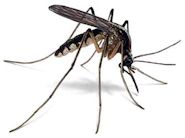WILMINGTON – The New Hanover County Health Department announced Wednesday that recent testing of local mosquito pools confirmed a positive sample of West Nile virus.
 The positive result, the first known case in the last 10 years, according to county records, came from a sample taken in the Sunset Park area on Sept. 18, said Jessica Loeper, the department’s communications and outreach coordinator.
The positive result, the first known case in the last 10 years, according to county records, came from a sample taken in the Sunset Park area on Sept. 18, said Jessica Loeper, the department’s communications and outreach coordinator.
Supporter Spotlight
Officials said the public should not be alarmed, but should be vigilant in protecting themselves from mosquito bites.
The department said its vector control staff monitors sites throughout the county, including coastal areas, for mosquito production and helps to control the mosquito population in the county through active surveillance, community education and mosquito spraying.
“Human incidence of West Nile Virus is rare, but remains a dangerous disease. There is no cure and no vaccine available for people, so citizens should protect themselves by preventing mosquito bites,” New Hanover County Health Director Phillip Tarte said in a statement. “Minimize unprotected outdoor exposure at dawn and dusk, the times during the day when mosquito activity peaks. Additional protective measures include applying insect repellent and wearing long-sleeved shirts and long pants. New Hanover County Health Department will continue proactive surveillance and control activities to identify mosquito-borne illnesses in an effort to protect our citizens and visitors of the county.”
The young, elderly and those with compromised immune systems are at greatest risk, and the virus can result in death. There are usually no symptoms in most people who become infected with West Nile virus. About one in five people who are infected will develop a fever with other symptoms such as headache, body aches, joint pains, vomiting, diarrhea or rash. Most people with this type of West Nile virus disease recover completely, but fatigue and weakness can last for weeks or months. Fewer than 1 percent of people who are infected will develop a serious neurologic illness such as encephalitis or meningitis, an inflammation of the brain or surrounding tissues. The symptoms of neurologic illness can include headache, high fever, neck stiffness, disorientation, coma, tremors, seizures or paralysis.
The department offered the following tips to help eliminate mosquito breeding and reduce the risk of mosquito-borne disease:
Supporter Spotlight
- Remove any containers that can hold water, even a small amount, including saucers under flower pots.
- Check tarps, buckets, toys, trash cans, under decks, wheel barrels, kayaks/canoes, boats, pools and pipes for standing water and eliminate the potential for these items to hold water.
- Store out-of-service or un-mounted tires under cover to prevent the collection of any water.
- Change the water in bird baths and pet bowls at least twice a week.
- Keep gutters clean and in good repair, and repair leaky outdoor faucets.
- When possible, drain any standing water on your property such as puddles and ditches that hold water for more than four days after rain.
- Make sure rain barrels have tight-fitting screens or lids.
- Use screened windows and doors, and make sure screens fit tightly and are not torn.







